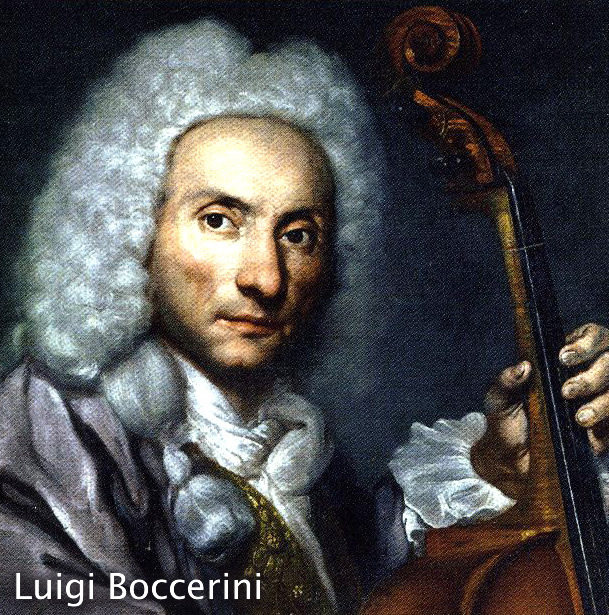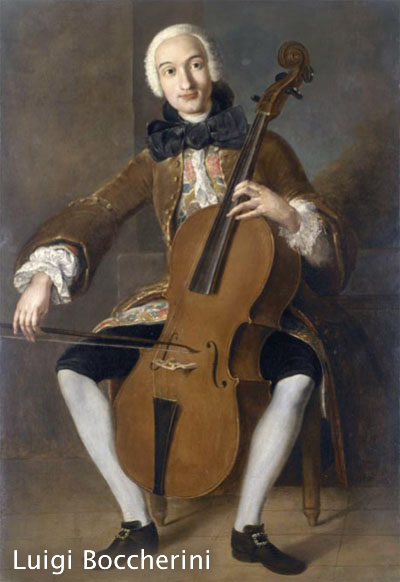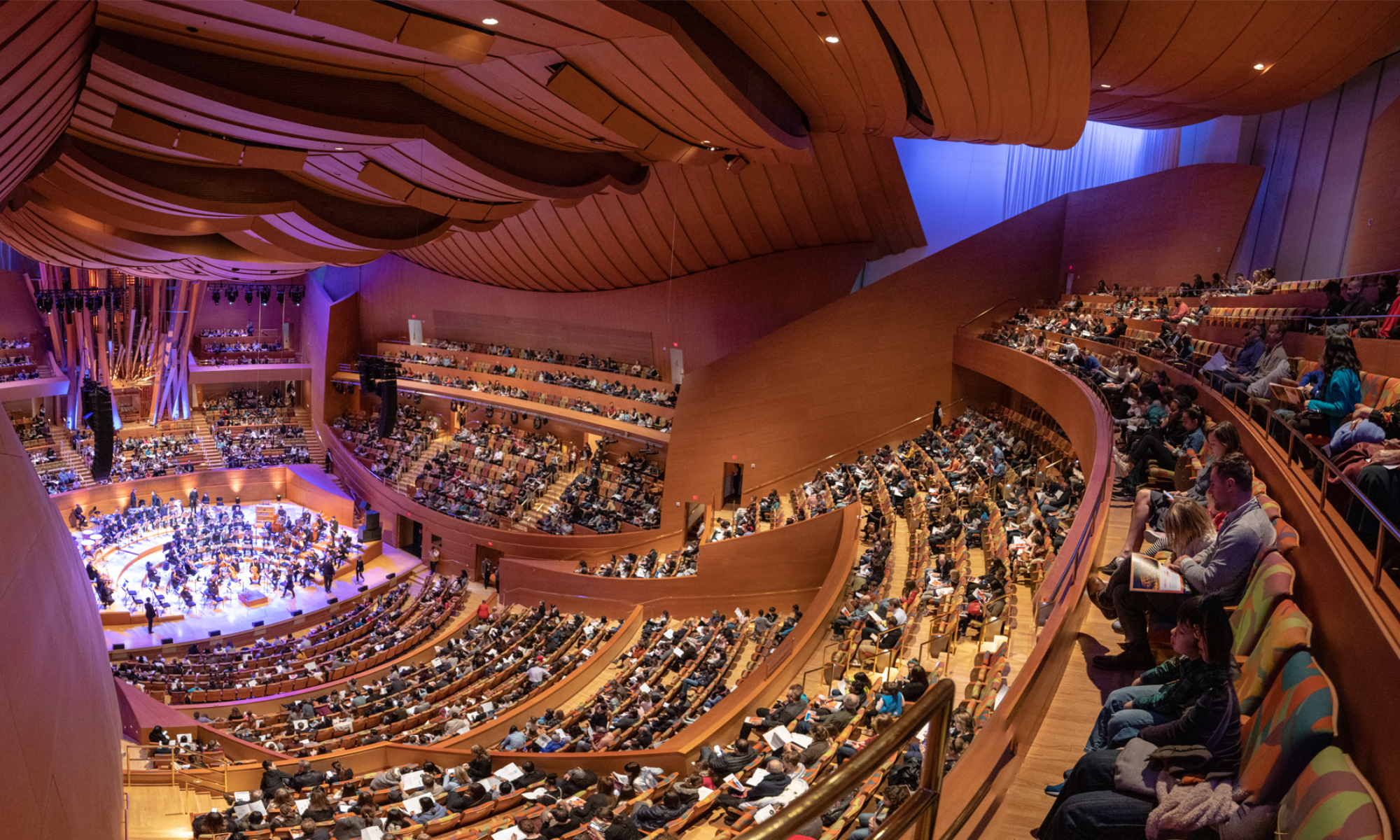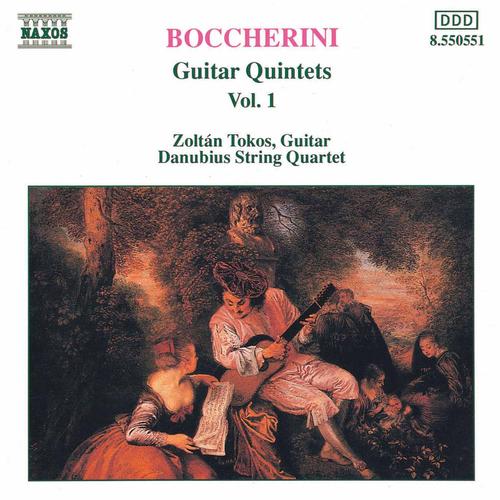Quintets for Guitar and String Quarter – Volume 1
Quintet in B-Flat Major, G. 447
Zoltan Tokos, Guitar
Danubius String Quartet (Judit Toth – violin; Adel Miklos – violin; Eniko Nagy – viola; Ilona Ribli – cello)
Recorded at the Unitarian Church in Budapest by Phoenix Studio from July 28-31, 1991
ONE-SENTENCE REVIEW:
I know very little about Boccherini and don’t listen to a lot of guitar quintets – so the following liner notes should be educational for both of us.
ORIGINAL LINER NOTES (by Keith Anderson):
 The Italian cellist and composer Luigi Boccherini was born in Lucca in 1743, the son of a double-bass player.
The Italian cellist and composer Luigi Boccherini was born in Lucca in 1743, the son of a double-bass player.
His family was distinguished not only in music, but boasted poets and dancers among its members.
His elder brother Giovan Gastone, born in 1742, was both dancer and poet, the author of the text of Haydn’s Il ritorno di Tobia and the libretti of some earlier stage-works of the Vienna Court Composer, Antonio Salieri.
His sister Maria Ester was a dancer and married Onorato Vigano, a distinguished dancer and choreographer. Her son, Salvatore Vigano, who studied composition with Boccherini, occupies a position of considerable importance in the history of ballet.
Boccherini was giving concerts as a cellist by the age of thirteen, and in 1757 went with his father to Vienna, where they both were invited to join the orchestra of the court theatre. Boccherini returned to Italy, but there were further visits to Vienna, before he finally secured a position in his native town.
In 1766, however, he set out with his fellow-townsman, the violinist Manfredi, a pupil of Nardini, for Paris, having performed with both violinists and with Cambini in chamber music in Milan the previous year.
 In France, Boccherini and Manfredi won considerable success, and the former continued his work as a composer, as well as appearing as a cello virtuoso.
In France, Boccherini and Manfredi won considerable success, and the former continued his work as a composer, as well as appearing as a cello virtuoso.
In 1768, the pair left for Spain, where Boccherini seems to have lived until his death in 1805.
In Madrid, he was appointed composer and virtuoso de camera to the Infante Don Luis, younger brother of King Charles III. Part of the following period he spent in Madrid and part at the Palace of Las Arenas in the province of Avila, where the Infante retired after an unacceptable marriage.
Members of the Font family were employed by Don Luis as a string quartet and renewed their association with Boccherini at the end of the century.
After the death of the Infante in 1785, the composer entered the service of the Benavente-Osuna family. At the same time, he was appointed court composer to Friedrich Wilhelm, who in 1787 became King of Prussia, providing the cell-playing king with new compositions on the same kind of exclusive arrangement that he had earlier enjoyed with Don Luis.
There is, however, no evidence that Boccherini ever spent any time in Prussia. After the death of Friedrich Wilhelm and the departure of other patrons from Madrid, Boccherini received support from Lucien Bonaparte, French ambassador in Madrid, and remained busy until the end of his life, although visitors reported that he lived all the appearance of poverty.
Boccherini’s style is completely characteristic of the period in which he lived, the period, that is, of Haydn rather than of Mozart or Beethoven.
 He enjoyed a reputation for his facility as a composer, leaving some 467 compositions. A great deal of his music is designed to exploit the technical resources of the cello, in concertos, sonatas, and, particularly, in chamber music for various numbers of instruments, including a remarkable series of quintets with two cellos.
He enjoyed a reputation for his facility as a composer, leaving some 467 compositions. A great deal of his music is designed to exploit the technical resources of the cello, in concertos, sonatas, and, particularly, in chamber music for various numbers of instruments, including a remarkable series of quintets with two cellos.
The twelve quintets for guitar and string quartet, of which eight have survived, are arrangements by the composer of works written for pianoforte quintet in the late 1790s.
The set of six quintets here recorded (only three in volume 1) were dedicated to the Marques de Benavent, an enthusiastic amateur guitarist.
The first, the only one in a minor key, is in four movements, and establishes the mood, its Spanish elements mingling happily with the idiom of Vienna.
It is followed by a three-movement Quintet in E major, ending in a Polish dance.
The third of the group, in B-flat major, returns to the four-movement form, its Minuet and Trio now preceding the slow movement.
TRACK LISTING:
- 1-4: Quintet in D Minor, G. 445 [19:53]
- 5-7: Quintet in E Major, G. 446 [18:16]
- 8-11: Quintet in B-Flat Major, G. 447 [21:26]
FINAL THOUGHT:
OK – so Boccherini was a prolific and important dude and his family was crazy talented. I need to investigate why his nephew (Salvatore Vigano) “occupies a position of considerable importance in the history of ballet.” It’s a nice, pleasant disc – brunch music – very Haydn. (Though the guitar is barely distinguishable in this recording – maybe that’s the style or the acoustics.)
 Emily Sachs – President – Manka Music Group (A division of Manka Bros. Studios – The World’s Largest Media Company)
Emily Sachs – President – Manka Music Group (A division of Manka Bros. Studios – The World’s Largest Media Company)



